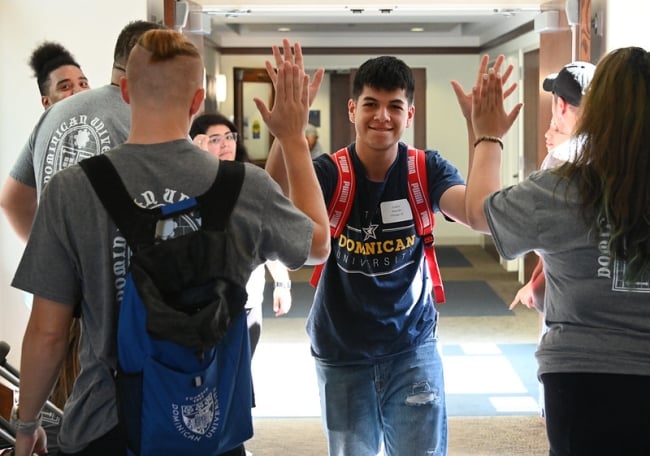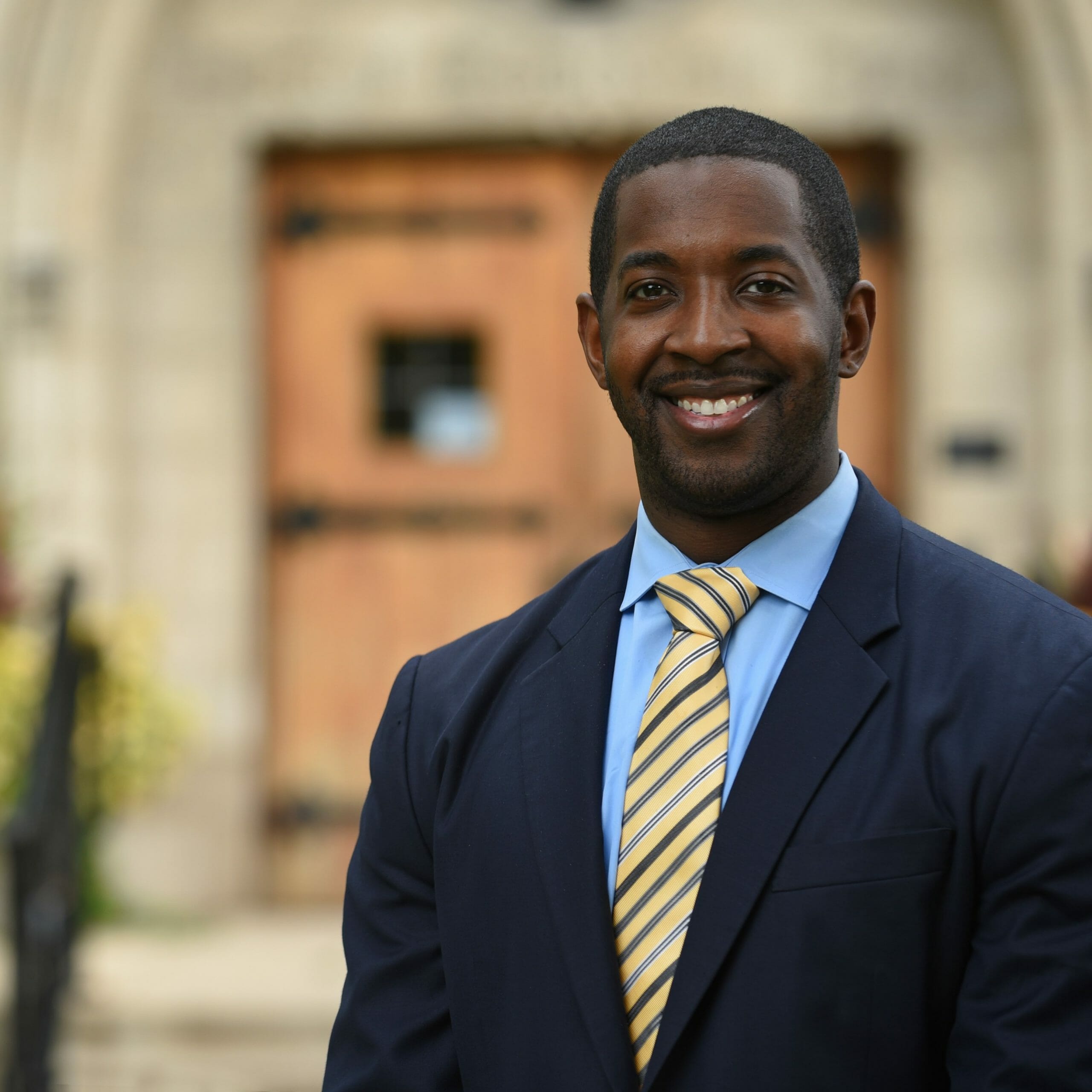You have /5 articles left.
Sign up for a free account or log in.

Barrington Price strives to inspire hope among students at Dominican University.
Dominican University
Fostering student success takes institutional leadership and collaboration. Barrington Price, Dominican University’s vice president of student success and engagement, knows this well—because he was a struggling first-generation college student himself.
Price spoke with Inside Higher Ed about his philosophy for student success, current initiatives at his Illinois-based institution and the lasting efforts of development work.
 Q: What attracted you to your role?
Q: What attracted you to your role?
A: My role is to find ways to help our students grow, thrive and overcome the challenges that can impede their academic success. Half of our students are the first in their families to attend college. Many work full-time. Success is hardly a given. I should know—I failed out of college my freshman year.
But I was lucky. My grandmother, who only had a seventh-grade education, never lost faith in me. She and my friends pushed me to try again. This time, I was fortunate to have an adviser, coaches and a myriad of mentors who didn’t allow me to retrench into my skewed perceptions of myself. They empowered my hope, and I became the first in my family to earn a bachelor’s degree.
Today, I embrace my role in helping Dominican University pursue its mission to help underresourced students achieve the opportunities that a college degree provides.
Q: What makes Dominican unique as an institution and as a student body?
A: At Dominican, we serve hundreds of first-generation college students. More than 70 percent of our undergraduate students are Latinx. This academic year, half of our first-year students required physical and mental wellness support within the first eight weeks of the semester. Nearly half needed financial support, and nearly one in five expressed concerns about adequate access to food or having a safe place to live. How can you talk about education when you’re hungry, scared and not sure where you’re going to sleep from one night to the next?
Most students at Dominican are not only overcoming these challenges, they are breaking through ceilings. The six-year graduation rate of our Hispanic students exceeds 60 percent, whereas it’s around 50 percent nationally. This past fall, we welcomed the largest first-year class in our history—at a time when college enrollment is dropping nationwide.
Q: What strategies does Dominican employ to create student success?
A: Our work begins in the summer before our first-year students arrive on campus. We send a brief survey to learn more about social determinants of their well-being, such as housing insecurity, transportation and financial distress. We ask students to respond in one of three ways: “I got this,” “I’m figuring it out” or “I need help.” If they ask for help, they get it. If they say they’re figuring it out, they get help anyway.
Dominican’s Care Network creates detailed care plans for each student through our partnership with NowPow, which helps connect students to local partners and resources in their home communities. For example, NowPow helps commuting students tap into community-based resources within walking distance of their homes, such as food pantries and mental health services. This past semester, 95 percent of Dominican’s first-year students received some type of support for basic needs.
For families of first-generation students, the cost of college can seem insurmountable. To help close this gap, Dominican offers financial literacy support through our Family Academy: we provide a series of sessions in both English and Spanish to connect families with Dominican’s financial support programs and introduce them to other families with similar issues. Families that attend five sessions also receive credit for their student to enroll in a summer course at no cost.
To help ease technology costs, Dominican partners with CDW Corporation to offer our Stars Align Tech Access Program. For students who participate in the program, Dominican covers the cost of a new laptop up front, allowing students to bundle the cost into their tuition support.
In 2019, Dominican redesigned our alert system to help new students stay on track academically. Throughout the semester, our dedicated alert team notifies us when a student has failed a test, has not attended a class or has missed other opportunities. Advisers then follow up with each student individually to offer support and provide guidance.
One way we foster a sense of belonging for students from diverse cultural backgrounds is through Dominican’s Center for Cultural Liberation. Our Pillars Scholars program supports first-year African American students, including by providing scholarships and opportunities to engage in community-based, social justice opportunities. From 2021–22, the Pillars Scholars program helped increase Dominican’s retention of African American students by 30 percent.
Q: Hope was important for you in your higher education journey. How does that build into your personal philosophy around student success?
A: I don’t believe that happens if we don’t recognize the importance of nurturing hope. For underprivileged students, hope has sustained them through many challenges. Still, college is often a remote concept. It’s not just about affordability, but achievability. Students can perceive themselves as less capable of learning than their peers. There’s a cognitive disconnect that cannot be overlooked.
Further, we must strive to reframe our perceptions of who can be successful. While there is no simple answer for how to better recruit and retain underresourced students, it starts with recognizing that each individual can thrive in a college environment, but it requires us to offer a level of commitment that extends well beyond classwork. It takes the initiative to ask what we can do today—not tomorrow or three years from now. Even when some of our programs fail to achieve the results we expected, we keep our focus on progress. If we’re learning from what hasn’t worked and moving forward, we are succeeding.
Q: What long-term effects are you seeing from these efforts?
A: Within a year of graduating, 78 percent of Dominican’s students go on to jobs at major corporations, start-ups, medical centers, nonprofits, schools and beyond. Around 20 percent enter graduate school.
For me, the greatest reward comes on graduation day, when first-generation college students walk across the stage to receive their diplomas. All the academia fades away in that moment to one prevailing thought: this moment is the beginning. They will carry torches of hope into their communities for the rest of their lives.
Seeking stories from campus leaders, faculty members and staff for our new Student Success focus. Share here.




